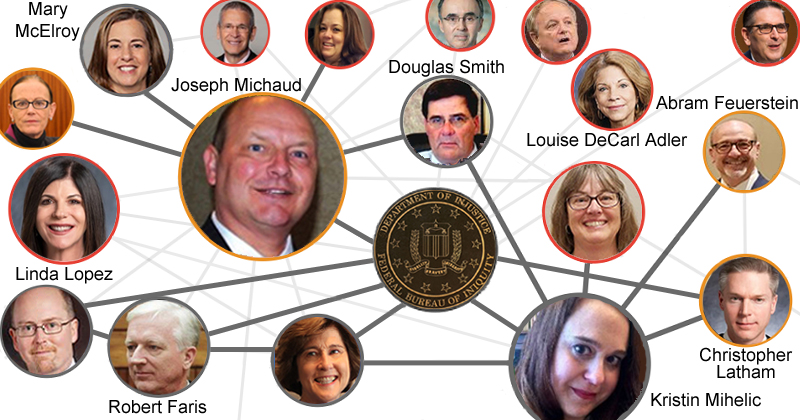Corruption in U.S. District Court RI—Joseph Michaud Conspires with Judge McElroy: Part Two of Two

Nationwide Web of Crime and Corruption
This post is a continuation of last month's. As astounding as these events are, and as intricate the web of crime and corruption, they are not unique to me. Our country's legal system is so incredibly bad that I have no doubt it is at least as bad as, if not worse than, any third world's system, such as Nigeria, Somalia, Mozambique, or even Mexico. Without further ado, here is part two of last month's post:
Judge Mary Susan McElroy completely mischaracterized my RICO claims. Courts have interpreted the term “enterprise” very broadly, and since they have ruled that “a court can be an enterprise for the purposes of RICO,” the Superior Court of Rhode Island is exactly that enterprise. However, while the Rhode Island state court is the “enterprise” as it can be according to law, none of the three RICO counts in the complaint are “against a municipality” or the court itself. Therefore, her analysis and supporting case law are inapposite. From Cianci, which is not on point: “It is not necessary in proving the existence of an enterprise to show that each member of the enterprise participated in or even knew of all of its activities.” In Cianci, the “enterprise” was charged in an indictment, whereas here that has not happened. Additionally, my complaint is against individuals. Of note in Cianci—parallel to the instant case with regard to member/defendant status of the “enterprise”—is that “the [c]ity was named a member of the charged enterprise, not a defendant. The [c]ity ‘shared’ in the enterprise’s purpose only to the extent of the defendants’ considerable influence and control.....”
Additionally, there are two distinct “enterprises” in the complaint: one in the traditional sense and one an association-in-fact strictly against Joseph Leonard Michaud, the latter of which she does not address. She then comes to the faulty conclusion that there is no “basis for federal [question] jurisdiction” after completely omitting this second RICO enterprise, count eight: violation of 11 U.S. CODE § 362, and several constitutional violations, including, but not limited to, the conspiracy of Michaud and trial court personnel, falsifying court records, predetermining the outcome of the case, and more in her “order.”
Diversity of jurisdiction requires that no plaintiffs are residing and domiciled in any of the states of the defendants. I made quite clear that the complaint satisfies this requirement and that I am not “domiciled abroad.” I specifically stated I am a “U.S. citizen residing and domiciled in the United States of America” (emphasis added). The plaintiff in Rivero-Parra concerned “a United States citizen residing in Japan.” That court also said “Plaintiff must demonstrate that he is a citizen of one of the fifty states,” which I have done. It didn’t say how to “demonstrate”—that any particular street address is required, much less in any particular state. In Cormier, the same analysis applies. Simply stating that someone is not a citizen of a certain state—without adding but “residing and domiciled in the United States”—does not meet diversity requirements “because some persons and entities are considered ‘stateless’,” those residing overseas, for instance. As I said earlier, I affirmed in the complaint that I was residing and domiciled in the United States but not in the states of any of the defendants, who are alleged to be residing and domiciled in the United States. No doubt remains that jurisdiction has been alleged to be diverse, and assertions and allegations in a complaint are to be taken as true.
Once again, her analysis is inapposite. She also refers to “caginess about where” I live. I do not provide a street address because of who I am. When someone is the arch enemy of the entire U.S. legal system and the world’s leading expert on the corruption in it, he has to take extra protective measures. I’ve been told that the system sent its minions to a certain residence looking for me with their hands on their weapons, most likely to cap me, throw my body in their trunk, and dump it in a swamp. I also have had federal agents looking for me at certain other locations. I do not take kindly to this and consider such actions highly threatening and dangerous. In the last paragraph of her order, Judge McElroy fails to mention any of her “other reasons” for dismissal.
As stated in my complaint, the court must construe it liberally because I am a pro se litigant, which Judge McElroy certainly did not do. The complaint should not have been dismissed. Judge McElroy claims my complaint “does not state a plausible claim for relief,” but does not state what part of the complaint, if any, is not a “plausible claim” anywhere in the order. To survive dismissal, the claim must be “plausible on its face,” meaning that the plaintiff must plead sufficient factual allegations to “allow[] the court to draw the reasonable inference that the defendant is liable for the misconduct alleged.” Once more, taking just count eight as an example, it alone could not be any more “plausible” than what has been pleaded. The judge insists that 2 + 3 = -72 and wants everyone else to believe that.
When I called the court on February 17, 2023, and spoke with Kayla, she said she’s never seen an IFP motion be granted and an opening order be issued, then be vacated, and then the complaint be dismissed weeks later. That’s because it’s never happened.....before now. If the judge can be swayed by a single phone call from someone who belongs in prison for his many crimes and who has exactly zero evidence, yet not allow a plaintiff who has 100 percent rock-solid evidence to proceed, then she is certainly not a judge I want presiding over my case. In fact, she should be permanently removed from the bench, if not imprisoned herself. If she stays on the case, the first thing she will do when the opposition files anything whatsoever with the court is dismiss it again. This is unacceptable and a clear violation of my constitutional rights. The injustice to which she has been part is the reason judges cannot be trusted and is specifically why I demanded a jury trial.
While there have been countless cases in U.S. history that have had greater injustices, the execution of George Stinney Jr., for example, none have had more instances of intentional misconduct and criminal acts than this one and its relatives. They have overtaken first place from the notorious criminal case underlying Fields v. Wharrie when it comes to pure nefarious activity. I don’t like when street criminals commit crimes against me, which has happened only a handful of times. I don’t like it, but I can handle it. What I absolutely can’t handle is when criminals within the world's largest crime syndicate commit crimes against me, which has happened dozens upon dozens of times, and not only deny their crimes, but then other system members cover for them by trying to hide evidence or redact records.
Judges are supposed to uphold the law, not be the biggest violators of it. Instead of being outraged by the reprehensible behavior of someone who should know better because he is allegedly versed in law, Judge McElroy went out of her way to condone his criminal acts. Instead of reporting Michaud for his illicit contact and additional crimes, she decided to improperly allow his clandestine communication and be complicit in his crimes. The U.S. Supreme Court in United States v. Will, 449 U.S. 200, 216, 101 S.Ct. 471, 66 L.Ed.2d 392, 406 (1980), citing Cohens v. Virginia, 6 Wheat. 264 (1821) was clear: a court “must take jurisdiction if it should. The judiciary cannot, as the legislature may, avoid a measure because it approaches the confines of the constitution. We cannot pass it by, because it is doubtful. With whatever doubts, with whatever difficulties, a case may be attended, we must decide it if it be brought before us. We have no more right to decline the exercise of jurisdiction which is given than to usurp that which is not given. The one or the other would be treason to the constitution. Questions may occur which we would gladly avoid; but we cannot avoid them” (emphasis original).
Moreover, the crimes committed by judicial actors related to the U.S. District Court for the District of Rhode Island have established it as a criminal enterprise according to the Seventh Circus, which held that the Circus Court of Cook County was similarly an enterprise because of the criminal elements involved there. See U.S. v. Murphy, 768 F.2d 1518, 1531 (7th Cir. 1985). Plenty of other case law has established the same. In addition to the misconduct of and crimes committed by Michaud and his minions, those actors have also thus violated 18 U.S.C. § 2, 3, and 4, which are federal crimes, and are opening themselves up to suit under the very violations and crimes that they are trying their best to hide.
Of note is another smoking gun. After Judge McElroy wrongly dismissed the complaint, she immediately went looking for any other cases I had pending and found 1:22-CV-00421, which I filed against Fidelity Investments and state entities for an unrelated claim. She dismissed it for the very same diversity “reason” so that the dismissal of the case against Michaud and others wouldn’t look so concocted. If she had allowed my second case in that court, the one just mentioned against Fidelity, to continue but not my first case—the subject of this post—that would have been a blaring red flag. However, in her enthusiasm to block me, she dismissed it on the very same day, February 7, 2023. She wasn’t even smart enough to wait several weeks to make it not look so obvious. There is no way Fidelity would have been next in the queue since it was filed almost two months after I filed my first case.
I am sick and tired of the system blocking me from justice. If the case was against me, the judge sure as hell would have allowed it to continue after what has now become abundantly apparent. Not only that, she would have contrived a judgment against me as so many corrupt judges have done over the last several decades. Just because a judge says something that is wrong or false doesn’t mean it is then true. It means the judge is corrupt. A judge could say—or order—that gravity doesn’t exist. We all (should) know that such a statement is false. The absolute worst the judge should have done is filed an order for me to amend, not completely dismiss the complaint, if there was any legitimacy to this whole charade.
When I brought the case into the United States Court of Appeals for the First Circus as a petition for writ of mandamus, I didn't tell the lower court. As opposed to an appeal, there is no requirement to notify opposing parties with such a petition. I specifically did not appeal because Michaud would get notified, call the appellate court, and once again likely contaminate the case. As with any matter, this one should be decided on facts and law, not lies and criminal influence.
This post wouldn’t be complete without discussing highly unlikely mathematical probabilities. Perhaps the most striking evidence against everything transpiring in this case and its ancestors according to law is the fact that I have been ruled against sixty-one consecutive times whenever I have been opposed or have filed an initial pleading with the court. Chances of such rulings purely happening naturally and without bias or external influence are absurdly improbable, that being 1 in 2,305,843,009,213,693,952, or less than 0.00000000000000004 percent. Hitting Powerball is relatively easy since the chances of winning that jackpot are 7,891,281,488 times greater because they are only 1 in 292,201,338. Considering that the chances of getting killed by a falling satellite are 1 in 21 trillion (110,000 times greater) and taking a 100-question multiple-choice quiz by purely guessing on every single question, yet getting all the answers correct, are 1 in 750 trillion (3,074 times greater), no doubt remains that the events in my legal battles have been rigged right along.
The top problem ever to plague this once-great nation is its off-the-rails, wildly corrupt legal system. It needs a complete overhaul. I suggest almost two dozen ways to fix it in chapter 7 of Our American Injustice System. Until it is fixed—if that ever happens—Sara and I also offer ways people can protect themselves from it in the crucial book Stack the Legal Odds in Your Favor. The latter stops the bleeding, and the former is the cure. Finally, disinfecting the cesspool we have today for a legal system would most likely only require the effort of several hundred people nationwide to email their senators weekly like I do. I have already done all the work. It can be found at this link and takes a mere three minutes each week. Spending that amount of leisure time now will save you months or years of problem-filled time later. I promise, at some point in the future, you will regret not taking any action now if you don't. Part 1 of this series.



 "The most important book written this century for Americans!"
"The most important book written this century for Americans!"








Comments
If you want to comment as a guest without signing in with social media and without signing up with Disqus:
1 – Enter your comment2 – Click in the Name box and enter the name you want associated with your comment
3 – Click in the Email box and enter your email address
4 – Select "I'd rather post as a guest"
5 – Validate the CAPTCHA and then click the arrow
comments powered by Disqus